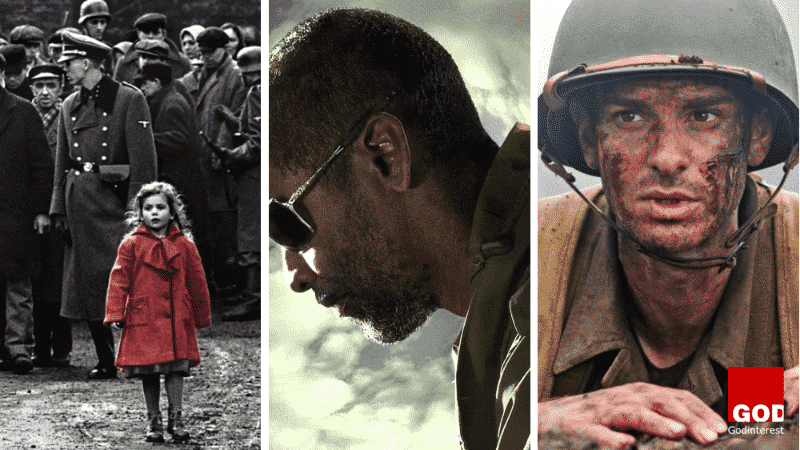Hidden themes that ring true with Christianity can be found everywhere in life. Since the bible is the greatest story ever, it’s no surprise that the world imitates certain themes that began with God.
Although they certainly don’t portray the gospel in its entirety, these films may offer opportunities for conversation with family or friends about the way that we live our lives. As these films portray so many things that have gone wrong with the world, we can find redemptive analogies to help us learn and change the story for the future.
Note: May contain spoilers! Read on at your own risk.
Les Miserable (2012)
Set in the midst of the French Revolution, Jean Valjean is a former prisoner who has broken parole and turned his life around. He vows to a dying woman (who was forced into prostitution) that he’ll take care of her daughter, committing to raise her as his own. Based on the novel by Victor Hugo, this musical film follows Valjean as his past haunts him. While he receives grace and forgiveness to transform him from being a hardened criminal into a loving father, he is ultimately faced with the opportunity to sacrifice himself for the love of another.
Themes: Grace, forgiveness, social responsibility, personal sacrifice, redemption, freedom
Warnings: Some profane language, violence, sexual themes related to prostitution, war, alcohol abuse, suicide
Wall-E (2008)
In the animated film, Wall-E, future humans have made such a mess on earth that they just leave it behind for a robot to clean up. The robot, Wall-E, has developed a personality over hundreds of years and seems to be a bit lonely. As he becomes engaged in an adventure, Wall-E ends up on the spaceship where humans have become the epitome of laziness. As evil has begun to take over the spaceship filled with humans, Wall-E is faced with a choice of whether to help out.
Themes: Laziness, sloth, loneliness, stewardship of the earth, running away from problems, self-sacrifice
Warnings: None
Hacksaw Ridge (2016)
https://www.youtube.com/watch?v=9BqgHYLvHIE
This WWII film tells the true story of Desmond Doss, a pacifist soldier who refused to carry a gun. While he believed that the war was justified, he also believed that killing was wrong. The story tells of Doss’s plight on the front lines of the Battle of Okinawa as he aided in saving 75 men, for which he received the Congressional Medal of Honor.
Themes: Faith, sacrifice, standing up for personal beliefs
Warnings: Intense violence, moderate use of profane language, alcohol use and smoking, nudity
The Book of Eli (2010)
Based on the theme of post-apocalyptic life, this film follows the journey of Eli, who travels west through America’s destroyed landscape. The story of this futuristic thriller begins to reveal that a critical part of human civilization is being carried by Eli in the form of a book. As books are being burned at a rapid rate by evil-doers, the preservation of this particular sacred book is critical.
Themes: Sacrifice, protection of scripture, good vs. evil, journey with a purpose
Warnings: Violence, profane language
Wonder Woman (2017)
One in a line of DC Comics films, Wonder Woman offers a new sense of accomplishment for the Justice League. Tackling difficult themes about human nature, the message of this film is highly compatible with the gospel message. Diana, who was raised by Amazons, learns at an early age about people who are created good but are then corrupted by evil. In the throes of war, Diana heads out to conquer the source of evil. She decides that, even though humans are corrupt and deserve to die, they are still worth saving—and she is ultimately inspired to believe in love.
Themes: Fall of humans, pursuing peace, value of human life, self-sacrifice
Warnings: Violence, sexual references and implication, mild profane language, alcohol and drug use
The Good Lie (2014)
Following the destruction of their village in Sudan, orphan siblings make the harrowing journey to a refugee camp and eventually settle in Kansas City in the U.S. As they make peace with their past and come to terms with re-settling in a new land, Carrie, an employment counselor, helps them to find jobs and search for their sister from whom they were separated. In the process, Carrie learns a lot about her own journey. One of the refugees has a strong faith and deeply desires to become a pastor. Many of the actors in this film are former Sudanese refugees—two were even child soldiers—allowing this film to accurately portray the true heart of the pain of war and difficult elements of starting over.
Themes: Helping others, sacrifice, redemption, starting over
Warnings: Sex implied but not shown, war violence, minimal profane language, alcohol and marijuana use
Schindler’s List (1993)
This film set during World War II tells the true story of a German, Oskar Schindler, who is seeking to take advantage of the war by becoming rich. Schindler’s character is hardened as shown in relationship to a concentration camp, but he becomes more sympathetic as he arranges to protect the Jewish employees who work in his factory. His motivation is originally greed, but eventually, he conjures up a way to save the lives of thousands of Krakow prisoners.
Themes: Discrimination, greed, power, helping the helpless, the value of human life, sacrifice
Warnings: Profane language, nudity, sexual themes, violence, war, drunkenness
It is important to note that most of these films contain very adult themes and problems, whether “fictional” or not. This is not meant to advocate for a glorification of violence, gratuitous sex, or other cultural troubles. But these are honest themes that the bible addresses on a regular basis—because they are part of this broken world. As these films portray the depravity of this world, I believe that we can find ways to share our hope in the One who came to set all things right.




